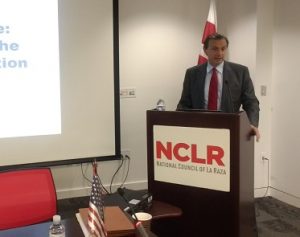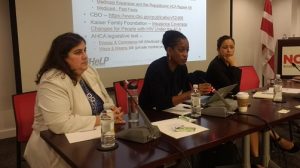Events

Health Care Symposium: Prevention, Privacy, and Price in the Wellness Society
May 23, 2017

Policy aficionados, legal and health care professionals, and interested citizens were on hand Tuesday, May 23rd for the frontier of the health care cosmos. The current Symposium, held at the elegant conference area in the Washington headquarters of the National Council of La Raza, was followed as well in real time by viewers on Facebook, while terse reports on the fast-paced scenes of policy and technical exposition were going out over Twitter. Ma. Cristina Caballero, Dialogue president and CEO, greeted attendees. Welcome was conveyed as well by Director Jackie Reyes of the D.C. Office of Latino Affairs, accompanied by her Deputy Julio Guity-Guevara. Also on the agenda was the presentation to Rep. Raúl Grijalva of Arizona of the Dialogue’s Trailblazer Award. The top question of the day concerned the ACA and the crusade to abolish it.
A panel of three experts – Jeanette Contreras of CMS, Janel George of the National Women’s Law Center, and Mara Yoedelman of National Health Law Program reviewed features of the latest proposed successor statute. The second round legislative proposal provided, among many other points, for more extensive state-level options and an apparent erosion of the prohibition on taking account of the insured’s medical history [“pre-existing” conditions]. The CBO estimate in this second roundate of the number of persons to be added to the ranks of the uninsured in the medium-run, remained approximately the same (23 – 24 mill.). Principal midday session speaker Dr. Joxel Garcia, holder of a succession of high ranking posts in the world of health care administration, now Executive Director of the planning and design function in the anti-Cancer program now famously gathering speed under the general direction of former Vice President Joseph Biden. Dr. Garcia mustered an impressive array of metrics laying out the ravages of cancer in its many forms, the specific targets of the most recent victories, and the proximate targets of the research now being aimed at such remaining types as colorectal, pancreatic, human papillomavirus, and numerous others.
A view of the economics of health care was spelled out by Prof. Paulo von Schirach, head of Washington’s GPI think tank, who pointed out the startling disparities between the per capita expenses of health care in the U.S. and the far more modest figures for every other country, while numerous measures of health care results show the U.S. with little better than mediocre results. One may hope, Prof. von Schirach suggested, for a revolution in these aspects of the health care system – the removal of price incentives for wasteful procedures, and the inculcation of a preventive ethos. 
Afternoon panels dealt with questions of linguistic/cultural barriers to health care access. Astrid Jimenez discussed he many-faceted efforts of Nueva Vida, of which she is Executive Director, in following disadvantaged minority patients every step of the way in negotiating the complexities of the health care system. Dr. Sergio Rimola reviewed the complex of health care facilities and the mutually supportive relationships of public and privacy entities in an efficient system, with primary reference to his own Virginia milieu. Rosalia Fajardo of Family and outlined the work that organization does in shepherding persons hard pressed by economic, domestic, and private mental health strains. Martin Mendoza of the FDA’s minority health office discussed the logic of all-important clinical trials and the need for minority subjects; while Jason Resendez reviewed the development of possible treatments for Alzheimer’s. Herman Alvarado of the Ana G. Mendez University offered a sophisticated analysis of learning – a project emerging from family, culture, language, in which research builds knowledge, and that action. Hilda Crespo, the versatile longtime Vice President at the Aspira Association, a Puerto Rican oriented educational institute, recounted the battle against HIV/AIDS in Aspira’s initiatives.
